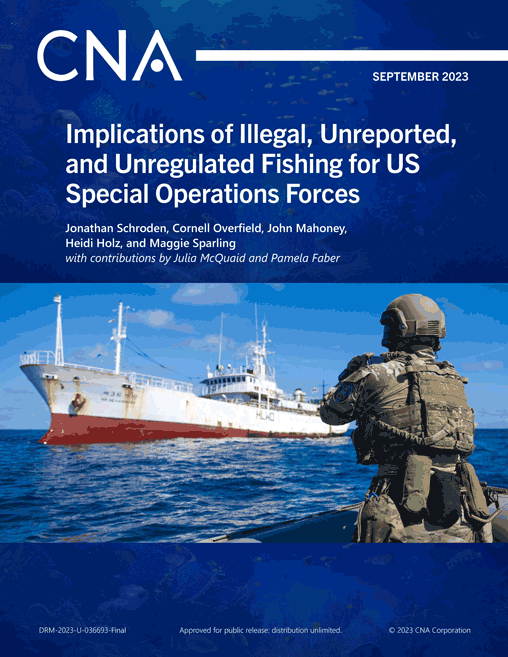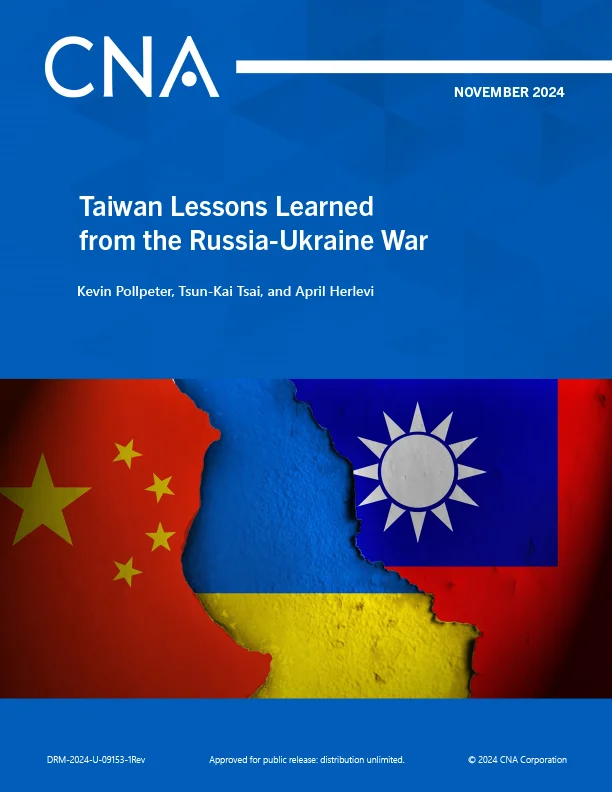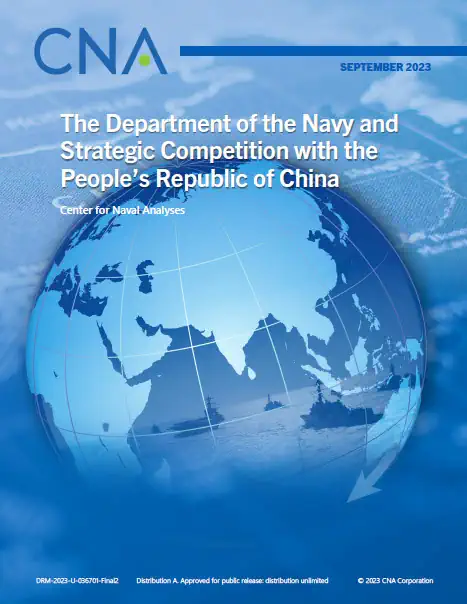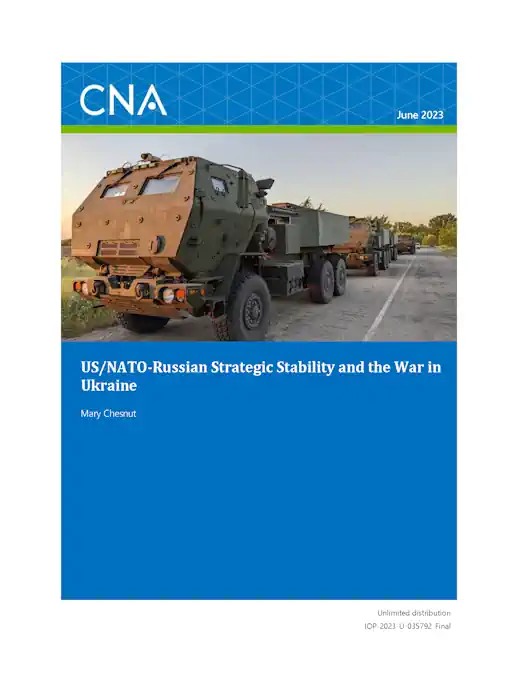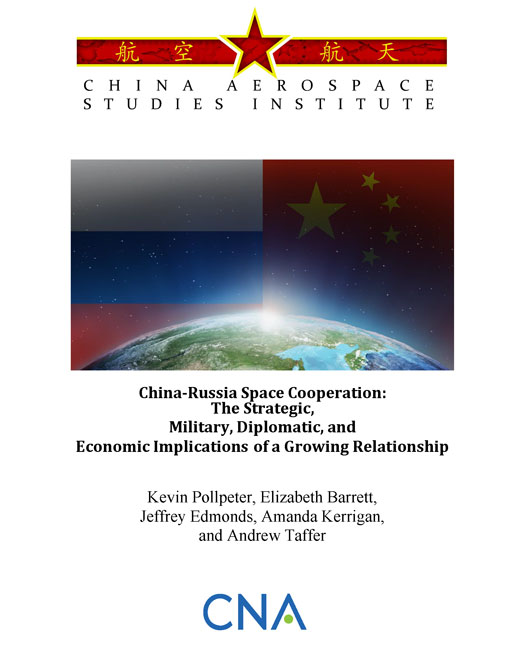In Special Operations Research Topics 2023, published by the Joint Special Operations University (JSOU), one of the highlighted topics of interest was the potential for special operations forces (SOF) to address illegal, unreported, and unregulated (IUU) fishing conducted by the People’s Republic of China (PRC).1 According to JSOU, “IUU resource extraction is inherently competition below the level of armed conflict”—a view shared by other authors—and SOF are interested in understanding to what extent they might be able to contribute to the amelioration of this issue. In this self-initiated study, we sought to characterize the nature and scope of the PRC’s IUU fishing activities, the set of approaches that nations have available to them to address and counter IUU fishing, the degree to which these approaches are aligned to the nature of the PRC’s activities, and the degree to which SOF might be able to contribute to the application of those tools.
According to a variety of US government (USG), academic, think tank, and other sources, IUU fishing is a complex phenomenon that generally cannot be solved with single policy fixes. Addressing the PRC’s IUU fishing activities listed above requires policies and capabilities that enable effective identification of suspicious behavior, as well as the capacity and capability to carry out enforcement actions when such behaviors are detected. Effective identification and enforcement may require technological, operational, legal, and political initiatives. The international legal context of the United Nations Convention on the Law of the Sea further complicates enforcement against fishing vessels from noncooperative states in the high seas. As a result, measures beyond enforcement might be necessary to address wrongdoing.
After comparatively analyzing the two tables above within the context of existing USG policies and approaches to countering the PRC’s IUU fishing activities, we identified information collection and sharing, training, and increasing crewed-vessel patrols as the approaches most conducive for SOF to explore. After examining a range of suggestions by other authors and our own subject-matter experts, we identified a small number of potentially feasible ideas that SOF might pursue in these three areas. Such efforts would be niche in nature, and SOF would be in a supporting role to other USG agencies— most notably, the US Coast Guard (USCG)—as well as those of partner nations (and, potentially, nongovernmental organizations). Looking across the ideas we identified, our overarching conclusion is that SOF can best support countering IUU fishing by serving as a “global connector” for this issue.
This role would entail three major components. First, it would involve establishing SOF as the leader for coordinating support to this issue within the Department of Defense (DOD) and with allied and partner militaries worldwide. Second, it would involve creating a centralized intelligence and information clearinghouse to ensure dissemination of critical information, reduce individual actor costs (via cost sharing) for obtaining that information, and enable more efficient use of crewed-vessel patrols for interdicting IUU fishing activities. Third, it would involve identifying, developing, and continuously adapting best-practice tactics, techniques, and procedures (TTPs) for countering such activities, as well as sharing and practicing those TTPs with partner-nation militaries and coast guards through exercises and training events. With these three components in mind, and assuming for the moment that the SOF enterprise remains interested in contributing to countering IUU fishing, we offer the following associated recommendations:
- Establish SOF as the DOD leader for countering IUU fishing. The commander of the US Special Operations Command (SOCOM) should consider advocating for the creation and assignment to him of the role of coordinating authority for countering IUU fishing. Doing so would place SOCOM in a lead DOD coordination role for this issue, as it currently is for such activities as countering violent extremist organizations and countering weapons of mass destruction. Although this authority is limited in scope, it would serve a foundational function in enabling the other recommendations below.
- Create a centralized intelligence and information clearinghouse for countering IUU fishing. The SOCOM commander should consider establishing an organization akin to Operation Gallant Phoenix to increase and improve the sharing of releasable intelligence and other information with allied and partnernation governments (e.g., coast guards and law enforcement agencies), multinational organizations, and (potentially) nongovernmental entities that are involved in, or have an interest in, countering IUU fishing activities. Initial priority partners for such an organization should include the five focus countries identified by the US Interagency Working Group on IUU Fishing (Ecuador, Panama, Senegal, Taiwan, and Vietnam).
- Identify, develop, and continuously adapt best-practice TTPs for countering IUU fishing; share and practice them with partner-nation militaries and coast guards through exercises and training events. The SOCOM commander should direct the theater special operations commands to incorporate IUU fishing in their exercises wherever this issue is important to US allies and partner nations and aligns with the goals of the geographic combatant commands. In addition, the commander of the Naval Special Warfare Command (NAVSPECWARCOM) should create a center of excellence for countering IUU fishing at the Naval Small Craft Instruction and Technical Training School to ensure that best-practice TTPs are identified and disseminated to US partners. The NAVSPECWARCOM commander should also engage the Navy’s Task Force 59 to develop and bring uncrewed surface and subsurface maritime surveillance systems—along with artificial intelligence and machine-learning technologies to quickly analyze the data these systems generate—to US partner nations globally (in collaboration with the US Department of State and USCG).
We recognize that these recommendations would come with some degree of increased costs for SOCOM and NAVSPECWARCOM, which might be a tough sell given that SOCOM’s budget has been flat for the past three years. Nonetheless, if SOF are interested in contributing to this issue area, we assert that playing the role of global connector—via the recommendations we provide above—is likely the least expensive and most cost-effective path. If SOF decide that this role is no longer of interest, the analysis summarized above should still be useful to other US government agencies involved in countering IUU fishing.
Download reportApproved for public release: distribution unlimited.
Details
- Pages: 78
- Document Number: DRM-2023-U-036693-Final
- Publication Date: 9/29/2023
